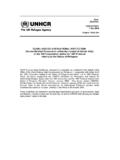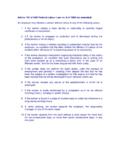Transcription of UPDATE TO ARTICLE 26 OF THE OECD MODEL TAX …
1 UPDATE TO. ARTICLE 26. OF THE OECD. MODEL TAX. convention . AND ITS. COMMENTARY. Approved by the OECD Council on 17 July 2012. UPDATE TO ARTICLE 26 OF THE OECD MODEL TAX convention AND ITS. COMMENTARY. Approved by the OECD Council on 17 July 2012. [The changes to the existing text of the OECD MODEL Tax convention and its Commentary appear in strikethrough for deletions and bold italics for additions]. ARTICLE 26. EXCHANGE OF INFORMATION. 1. The competent authorities of the Contracting States shall exchange such information as is foreseeably relevant for carrying out the provisions of this convention or to the administration or enforcement of the domestic laws concerning taxes of every kind and description imposed on behalf of the Contracting States, or of their political subdivisions or local authorities, insofar as the taxation thereunder is not contrary to the convention .
2 The exchange of information is not restricted by Articles 1 and 2. 2. Any information received under paragraph 1 by a Contracting State shall be treated as secret in the same manner as information obtained under the domestic laws of that State and shall be disclosed only to persons or authorities (including courts and administrative bodies) concerned with the assessment or collection of, the enforcement or prosecution in respect of, the determination of appeals in relation to the taxes referred to in paragraph 1, or the oversight of the above.
3 Such persons or authorities shall use the information only for such purposes. They may disclose the information in public court proceedings or in judicial decisions. Notwithstanding the foregoing, information received by a Contracting State may be used for other purposes when such information may be used for such other purposes under the laws of both States and the competent authority of the supplying State authorises such use. 3. In no case shall the provisions of paragraphs 1 and 2 be construed so as to impose on a Contracting State the obligation: a) to carry out administrative measures at variance with the laws and administrative practice of that or of the other Contracting State.
4 B) to supply information which is not obtainable under the laws or in the normal course of the administration of that or of the other Contracting State;. c) to supply information which would disclose any trade, business, industrial, commercial or professional secret or trade process, or information the disclosure of which would be contrary to public policy (ordre public). 4. If information is requested by a Contracting State in accordance with this ARTICLE , the other Contracting State shall use its information gathering measures to obtain the requested information, even though that other State may not need such information for its own tax purposes.
5 The obligation contained in the preceding sentence is subject to the limitations of paragraph 3 but in no case shall such limitations be construed to permit a Contracting State to decline to supply information solely because it has no domestic interest in such information. 1. 5. In no case shall the provisions of paragraph 3 be construed to permit a Contracting State to decline to supply information solely because the information is held by a bank, other financial institution, nominee or person acting in an agency or a fiduciary capacity or because it relates to ownership interests in a person.
6 COMMENTARY ON ARTICLE 26. CONCERNING THE EXCHANGE OF INFORMATION. I. Preliminary remarks 1. There are good grounds for including in a convention for the avoidance of double taxation provisions concerning co-operation between the tax administrations of the two Contracting States. In the first place it appears to be desirable to give administrative assistance for the purpose of ascertaining facts in relation to which the rules of the convention are to be applied. Moreover, in view of the increasing internationalisation of economic relations, the Contracting States have a growing interest in the reciprocal supply of information on the basis of which domestic taxation laws have to be administered, even if there is no question of the application of any particular ARTICLE of the convention .
7 2. Therefore the present ARTICLE embodies the rules under which information may be exchanged to the widest possible extent, with a view to laying the proper basis for the implementation of the domestic tax laws of the Contracting States and for the application of specific provisions of the convention . The text of the ARTICLE makes it clear that the exchange of information is not restricted by Articles 1 and 2, so that the information may include particulars about non-residents and may relate to the administration or enforcement of taxes not referred to in ARTICLE 2.
8 3. The matter of administrative assistance for the purpose of tax collection is dealt with in ARTICLE 27, but exchanges of information for the purpose of tax collection are governed by ARTICLE 26 (see paragraph 5 of the Commentary on ARTICLE 27). Similarly, mutual agreement procedures are dealt with in ARTICLE 25, but exchanges of information for the purposes of a mutual agreement procedure are governed by ARTICLE 26. (see paragraph 4 of the Commentary on ARTICLE 25). 4. In 2002, the Committee on Fiscal Affairs undertook a comprehensive review of ARTICLE 26 to ensure that it reflects current country practices.
9 That review also took into account recent developments such as the MODEL Agreement on Exchange of Information on Tax Matters1 developed by the OECD. Global Forum Working Group on Effective Exchange of Information and the ideal standard of access to bank information as described in the report "Improving Access to Bank Information for Tax Purposes".2 As a result, several changes to both the text of the ARTICLE and the Commentary were made in 2005. Many of the changes that were then made to the ARTICLE were not intended to alter its substance, but instead were made to remove doubts as to its proper interpretation.
10 For instance, the change from necessary . to foreseeably relevant and the insertion of the words to the administration or enforcement in paragraph 1. were made to achieve consistency with the MODEL Agreement on Exchange of Information on Tax Matters and were not intended to alter the effect of the provision. New pParagraph 4 was added to incorporate into the text of the ARTICLE the general understanding previously expressed in the Commentary (cf. see paragraph ). New pParagraph 5 was added to reflect current practices among the vast majority of OECD member 1.















